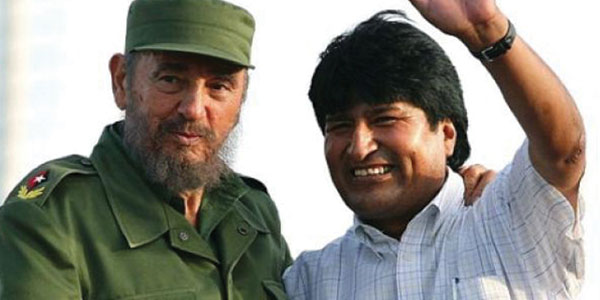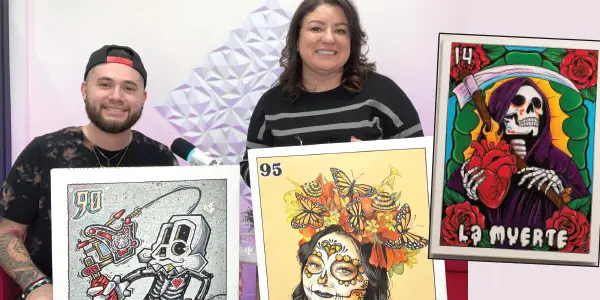
In Latin America there are a group of presidents — political dinosaurs — who have stuck around for a long time because they refuse to give up power. They consider themselves indispensable, yet have no idea how much damage they’re doing to democracy and their respective nations.
In Ecuador, President Rafael Correa was in power from 2007 to 2017, but he wanted more. He was already setting himself up to run again in 2021, but in a recent referendum, almost two-thirds of voters in Ecuador said no to Correa, and yes to presidential term limits. Still, I wouldn’t be surprised if Correa made another attempt to return to the presidency, whether by hook or by crook.
I interviewed Correa years ago, and he refused to call Cuba’s Fidel Castro a dictator. This is a trait shared by many of these rulers who consider themselves irreplaceable. They seem to think: “If Fidel stayed in power forever, why shouldn’t I?”
Similarly, Bolivian President Evo Morales, during a conversation in La Paz shortly after his first inauguration in 2006, told me: “I respect and admire Fidel Castro. They have democracy over there. To me, Fidel is a democratic man who defends people’s lives.” It’s really worrisome when a president admires a dictator, since leaders like these don’t like to be challenged. In fact, my 15-minute interview with Morales ended before we were halfway through it because he didn’t like my questions.
So it should come as no surprise that Morales wants to run for an unprecedented fourth term in 2019. And last year, Bolivia’s high court cleared the way for him to do just that.
In Nicaragua, the Ortega family is following the example set by the Somoza regime. Everything in Nicaragua is under the control of President Daniel Ortega, which is ironic, given that Ortega is a former guerrilla who fought against the dictatorship of Gen. Anastasio Somoza Debayle years ago. Now, he is creating his own authoritarian system. Ortega came to power in 1979, following the Sandinistas’ victory in Nicaragua, then lost the presidency to Violeta Chamorro in 1990. He won it back again in 2007 and has been in power ever since. The last time Ortega was re-elected, in 2016, his wife, Rosario Murillo, became vice president.
Before his presidential campaign in 2007, I interviewed Ortega in Managua, Nicaragua.
“Just like we managed to seize power by means of weapons,” he told me, referring to his days in the Sandinista National Liberation Front, “now the challenge is to seize power by means of votes.” And he succeeded.
When I asked Ortega about Cuba, his answer was, of course, totally predictable. “Fidel Castro isn’t a dictator, he is a revolutionary,” Ortega said, as though revolutions justified the imposition of dictatorships.
Another example of a man that has clung to power no matter what is Nicolás Maduro, Venezuela’s dictator. During his time as president, opponents of his regime have been killed or imprisoned; he has censored the press; his administration has taken control of the army and the courts; and he has drastically curtailed the power of the opposition-controlled National Assembly. Maduro now intends to hold presidential elections on April 22.
He was put where he is by Hugo Chávez before his death in 2013, and by then Maduro had learned Chávez’s tricks. When he was first elected, Chávez promised that he would hand over power after his first term ended, or sooner, then held on to the presidency for 14 years. Maduro, having followed Chávez’s example, has managed to turn Venezuela into one of the poorest, most repressed and hopeless nations in the hemisphere.
Last year in Honduras, President Juan Orlando Hernández brushed aside the constitutional limit of one term and imposed himself on the country for a second. The demonstrations, deaths and international complaints that followed his re-election were in vain. Hernández took office surrounded by the police and the army. This is the image Honduras projected: a country with some of the most violent cities in the world, and a would-be dictator who can’t go out on the streets.
Finally, the great dictatorship: Cuba. Since 1959, the Castro brothers, Raul and Fidel, have led one of the most repressive and anti-democratic systems in the Americas. Their dictatorship has been every bit as brutal as that of Augusto Pinochet in Chile, and they have set a miserable example for the many Latin American leaders who, faced with the temptation of holding on to power, have thrown democracy out the window. Worst of all, these leaders fail to realize that they have chosen to be on the wrong side of history.
(Jorge Ramos, an Emmy Award-winning journalist, is a news anchor on Univision.)
_________________________________________________________________________________________
Atornillados al Poder
Hay presidentes que se atornillan al poder, que llegan con votos — o con trampas — y luego se quieren quedar por la fuerza. En América Latina hemos tenido un nutrido grupito de dinosaurios que se han negado a entregar el poder. Se sienten indispensables y no se dan cuenta del enorme daño que le hacen a la democracia y a sus países.
Los ecuatorianos le acaban de poner un alto al presidente Rafael Correa. Después de estar 10 años en la presidencia (2007-2017), quería más. Ya se veía como candidato, otra vez, en el 2021. Sin embargo, un referéndum reciente determinó que casi dos terceras partes de los ecuatorianos no estaban de acuerdo y Correa se quedó con las ganas (aunque no me sorprendería para nada que Correa volviera a intentar, por las buenas o por las malas, regresar a la presidencia).
En una vieja entrevista que tuve con Correa, se negó a llamarle dictador a Fidel Castro. Esa es, curiosamente, una característica que tienen en común varios de los gobernantes que se niegan a entregar el poder en el continente: “Si Fidel se eternizó gobernando, ¿por qué yo no?”
El presidente boliviano, Evo Morales, durante una conversación en La Paz poco después de su primera toma de posesión en el 2006, me dijo: “Lo respeto y admiro (a Fidel Castro). Allá hay democracia. Para mí Fidel es un hombre democrático que defiende la vida”. Hay algo muy preocupante cuando un presidente admira a un dictador. De entrada, no les gusta que nadie los cuestione. Mi entrevista de 15 minutos con Morales terminó antes de llegar a la mitad porque no le gustaron mis preguntas.
Con esa visión, no es nada sorprendente que Morales se quiera postular para un cuarto mandato en el 2019. Un Tribunal Constitucional, haciendo malabares, le dio a Morales lo que quería.
En Nicaragua, la familia Ortega está siguiendo el ejemplo del régimen Somoza. El presidente Daniel Ortega controla todo en Nicaragua, lo que resulta irónico puesto que Ortega es un exguerrillero que luchó contra la dictadura del general Anastasio Somoza Debayle hace algunas décadas. Ahora él está creando su propio sistema autoritario. Ortega llegó al poder en 1979 con el triunfo de la revolución sandinista en Nicaragua, pero luego perdió la presidencia ante Violeta Chamorro en 1990. Recuperó el poder en 2007 y desde entonces no lo ha soltado. La última vez que Ortega fue reelecto, colocó a su esposa, Rosario Murillo, en la vicepresidencia.
Antes de su campaña presidencial en el 2007, hablé con Ortega en Managua, Nicaragua. “Así como logramos tomar el poder con las armas”, me dijo, “ahora el desafío es tomar el poder con los votos”. Y lo logró. Cuando le pregunté sobre Cuba, su respuesta fue totalmente predecible: “Fidel Castro no es ningún dictador, es un revolucionario”. Como si las revoluciones fueran una justificación para imponer dictaduras.
Otro atornillado al poder es Nicolás Maduro, el dictador de Venezuela. Su régimen tiene prisioneros políticos, ha asesinado opositores, censura a la prensa, controla al ejército y las cortes, destituyó a la Asamblea (controlada por la oposición) y ahora pretende tener elecciones presidenciales el 22 de abril.
Maduro fue impuesto por dedazo por Hugo Chávez — antes de su muerte en marzo del 2013 — y le aprendió sus mañas. Chávez prometió entregar el poder en cinco años o menos y se quedó 14. Maduro le sigue los pasos y ha logrado convertir a Venezuela en una de las naciones más pobres, reprimidas y desesperanzadas del hemisferio.
En Honduras el presidente Juan Orlando Hernández se saltó la constitución y se impuso para un segundo mandato presidencial. De nada sirvieron las protestas, los muertos y las denuncias internacionales. Tomó posesión rodeado de policías y militares. Esa es la imagen de Honduras: un país con algunas de las ciudades más violentas del mundo y un aprendiz de dictador que no puede salir a la calle.
Y por último, la gran dictadura: Cuba. Desde 1959 los hermanitos Castro, Raúl y Fidel, han liderado uno de los sistemas más represivos y antidemocráticos del continente. Su dictadura ha sido tan brutal y castrante como la de Augusto Pinochet en Chile. Hoy están aterrados de abrirse un poquito. Ha sido un terrible ejemplo para muchos líderes latinoamericanos que, ante la tentación de atornillarse al poder, tiran la democracia por la ventana.
Ellos, en su sillita, no se dan cuenta que se han puesto del lado equivocado de la historia.
(Jorge Ramos, periodista ganador del Emmy, es el principal director de noticias de Univision Network. Ramos, nacido en México, es autor de nueve libros de grandes ventas, el más reciente de los cuales es “A Country for All: An Immigrant Manifesto”.)









